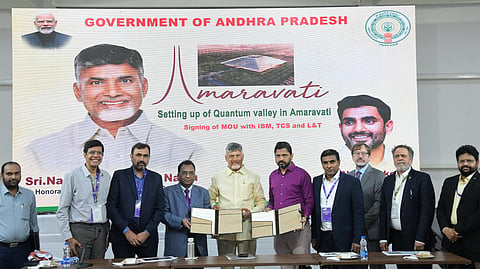Andhra signs deal to set up India’s first Quantum Valley in Amaravati
VIJAYAWADA: In a transformative leap for India’s technological landscape, Andhra Pradesh Chief Minister N Chandrababu Naidu announced the establishment of India’s first Quantum Valley, set to be dedicated to the nation on January 1, 2026.
The landmark announcement was made at the Chief Minister’s residence in Undavalli during a signing ceremony for Memoranda of Understanding (MoUs) with global giants IBM, Tata Consultancy Services (TCS), and Larsen & Toubro (L&T). These partnerships will anchor the Quantum Valley Tech Park in Amaravati, featuring IBM’s 156-qubit Quantum System Two, the largest quantum computing system to be installed in India.
Addressing the gathering, the Chief Minister underscored Andhra Pradesh’s legacy in driving India’s IT revolution in the 1990s and its ambition to lead the global quantum computing frontier.
Reflecting on past innovations like digitizing seven lakh government records and launching AP Online, he highlighted the state’s shift to “WhatsApp governance” enabled by voice commands.
“This is a historic moment for Andhra Pradesh and India,” Naidu declared. “Quantum computing is unstoppable and will redefine governance and innovation.”
CM Naidu envisioned Quantum Valley as a Silicon Valley-inspired ecosystem, integrating academia, startups, and global expertise. He emphasized real-time analytics and inclusive policies, citing the state’s analysis of 1.7 crore families under the P4 initiative with TCS support.
Two committees to be set up to expedite project
Financial constraints, he assured, would not impede progress. Naidu urged a time-bound approach to create a scalable model for national replication, referencing the rapid development of Hyderabad’s Hi-Tech City in 15 months as a benchmark. He announced plans to brief Prime Minister Narendra Modi, noting their shared enthusiasm for technology.
To expedite the project, two committees will be formed: one for infrastructure and another for ecosystem development. L&T will soon commence construction of the main quantum facility and supporting infrastructure, ensuring simultaneous progress.
IBM’s Vice-President of Quantum, Jay Gambetta, hailed the deployment of Quantum System Two in Amaravati as a milestone for India’s quantum journey. He emphasized that collaboration with TCS and Andhra Pradesh would accelerate quantum algorithm development, advancing the goal of “quantum advantage.”
TCS CTO Dr Harrick Vin outlined a hybrid computing strategy integrating quantum with classical systems, predicting breakthroughs in life sciences, cryptography, and materials science. TCS leaders V Rajanna and C V Sridhar reaffirmed their commitment to innovation.
Rajanna highlighted TCS’s role in digital governance under Naidu’s leadership, while Sridhar noted that TCS’s Co-Innovation Network and seven years of quantum research would empower 43 research centres across 17 Indian states to tackle real-world challenges.
IBM’s Scott Crowder described quantum computing as the “second quantum revolution,” with applications ranging from EV batteries to financial anomaly detection. He underscored India’s software and tech capabilities as key to IBM’s investment.
K Bhaskar, Secretary of IT & RTGS, called the MoUs a pivotal shift from traditional to quantum computing, positioning AP as a tech leader. The Quantum Valley Tech Park will drive high-end job creation, talent development, and global investment.
Plans include quantum-enabled public services like GST optimization and real-time census modelling, alongside India’s first quantum governance framework. With its dedication slated for January 1, 2026, AP is poised to establish India as a global quantum computing hub, redefining innovation.

